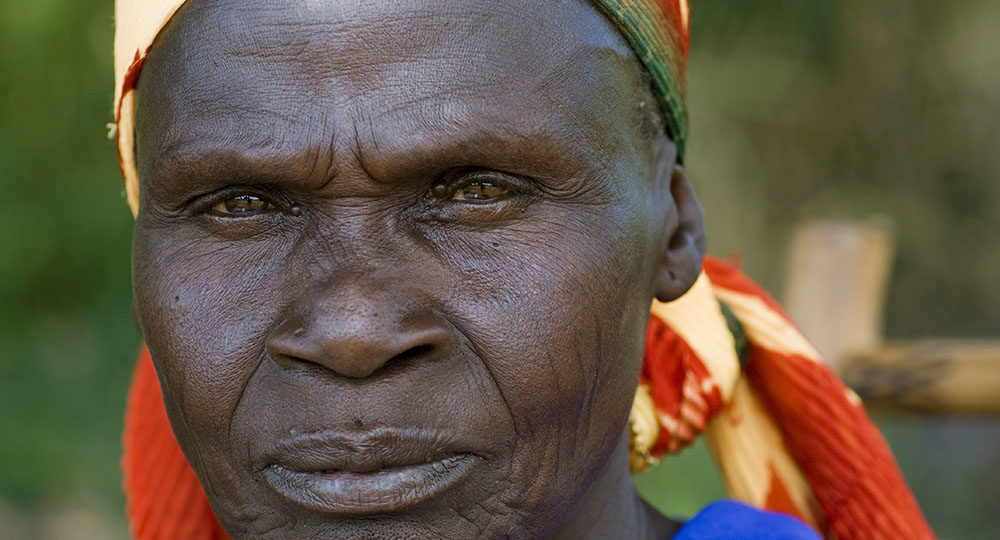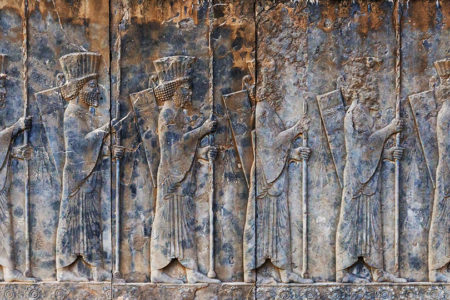No More Villages to Burn
Much has been made recently of the so-called easing up on Christian persecution in Sudan. The West relishes taking comfort in such insipid reports from insufferably cruel Islamists in Khartoum claiming things are looking up, that there is a widening stream of benevolence flowing from Islamists toward Christians and animists in Southern Sudan. Don’t believe a word of it.
While reporting on the fragile calm heralded as a harbinger of peace in the western province of Darfur, a UN official stated that the calm only exists because “there are no more villages to burn.” The facts tell a far different story. There are plenty more villages to burn, but most people don’t care.
Agence France-Presse (AFP) reported recently that the UN human rights chief accused the Sudanese government of conducting a “reign of terror” and committing “repeated war crimes and crimes against humanity.”
“An estimated one million people [probably a low estimate] have been displaced inside the country, and a UN report has said the government was deliberately starving some of them. More than 100,000 others have fled across the border into Chad,” AFP reported.
To focus on this tip of the iceberg almost insults the integrity of the people who know what actually is taking place on this planet, particularly those caught in a life and death struggle for survival in the countries of their birth.
In a perceptive article titled “Column One: Stop Navel Gazing,” Jerusalem Post columnist Caroline Glick wrote, “We are in a world war and yet we do not notice it.” Glick is correct. What is happening in Sudan is only one small instance of what is taking place all over the world. Consider Africa:
Today 11 of Nigeria’s 36 states are governed by Sharia law. Rights of women and non-Muslims in these areas have been summarily destroyed. Nigeria’ s turn to Jihad has been spurred on by foreign Arabs. Palestinians, Saudis, Syrians and Sudanese have all been acting as advisers to the mullahs in Nigeria and have been actively funding and training the Muslim militias that have killed thousands of Christians there over the past few years.1
Nonie Darwish, an Arab American and former Muslim, delineates the differences and dangers faced by indifferent and uninformed Americans:
Having grown up in the Arab world myself, I believe that expectations in the Muslim world are often hypocritical. Arab Muslims especially do not reciprocate much of their demands from the West. They demand tolerance for Muslims in the West while their religious leaders call on murder of the infidels. They demand freedom to build mosques in the West, but prohibit the building [of] churches and synagogues in Muslim countries. They jail and kill missionaries in the Muslim world, while they freely preach Islam and extremism to our citizens, even to our vulnerable and angry prison population. . . . There is something very wrong with this picture and many Arabs and freedom loving Americans don’t see it. It is time for Americans to wake up.2
Not long ago I looked up a partial list of atrocities perpetrated against Christians in Africa. That list documents at least sixty-three recent instances of severe persecution at the hands of Muslim militants. Countries where these vicious crimes occurred were, among others, Ethiopia, Sudan, Nigeria, Mali, Zimbabwe, Brunei, Mozambique, Egypt, and Sierra Leone.
A personal portrait came to me while I was involved in a broadcast interview with a Christian bishop, James Barclay, who recently fled his lifelong home in Liberia, a country created in the aftermath of the American Civil War as an enclave of peace and democracy for former black slaves. The bishop shared the emotional story of how he had been forced to leave his country because militant Muslims had marked him for death in an Islamic coup sponsored, funded, supplied, and trained by Mohammar Quaddafi and the Libyans.
But do Muslim militants have their sights set only on Africa and the Middle East? No. They are engaging the entire world in an unrelenting conflict. Columnist Daniel Pipes has spoken to the fact that Europe is on the brink of Islamic colonization:
“Europe becomes more and more a province of Islam, a colony of Islam.” So declares Oriana Fallaci in her new book, . . . The Force of Reason. And the famed Italian journalist is right: Christianity’s ancient stronghold of Europe is rapidly giving way to Islam.3
Wrote Pipes, “Two factors mainly contribute to this world-shaking development”: the “hollowing out of Christianity” and an “anemic birthrate.”
Europe is increasingly a post-Christian society, one with a diminishing connection to its tradition and its historic values. The number of believing, observant Christians has collapsed in the past two generations to the point that some observers call it the “new dark continent.” Already, analysts estimate Britain’s mosques host more worshippers each week than does the Church of England.4
Why?
Current trends suggest Islamization will happen, for Europeans seem to find it too strenuous to have children, stop illegal immigration, or even diversify their sources of immigrants. Instead, they prefer to settle unhappily into civilizational senility.
Into the void are coming Islam and Muslims. As Christianity falters, Islam is robust, assertive, and ambitious. As Europeans under-reproduce at advanced ages, Muslims do so in large numbers while young.5
Peter Hitchens underscores the impact of the “hollowing out” plague in England leading to the spiritual sterility that has opened the door for the current, no-contest struggle between Islam and Christians:
Hell was abolished around the same time that abortion was legalized and the death penalty was done away with. . . . After all, nobody went to Hell any more, did they? For by the 1960s, eternal damnation, like most of the more worrying aspects of the Christian religion, had apparently fallen into disuse. Bishops . . . had begun to admit, rather coyly to start with, that they were not sure about the existence of God or the truth of their religion’s central beliefs.6
And when an unbelieving clergy staffs the pulpits, the fallout among parishioners becomes a fact of religious life. Furthermore, when establishment Christianity relegates itself to an irrelevant, self-destructive, also-ran body of secularized social reconstructionists, why should true believers bother to fill the pews?
When there are no souls to be saved, only bodies . . . there is only one object: to make their living conditions better, even if they then grow up . . . in grave moral poverty….If you do not believe in sin, then you can hardly be expected to use up much energy fighting against it. And if you do believe in sin, then you are “judgmental,” and automatically excluded from the debate.7
We are well aware that this “hollowing out” process Mr. Pipes writes about also plagues the evangelical community in America. To single out England as the chief advocate of theological and spiritual capitulation is unfair. The situation, however, does illustrate the growing problem endemic in the West, including the United States; and if the phenomenon is less evident in America than in Britain, it is only because of differences in size and population.
Perhaps the most telling portion of Hitchens’s analysis is this: “And if you do believe in sin, then you are ‘judgmental,’ and automatically excluded from the debate.” This is the crux of the difficulty—aline of demarcation that separates Bible-believing evangelicals from mainline Protestants in whatever countries they reside. The issue is not one of semantics and superficial, theological differences of opinion. People who steadfastly believe in the major tenets of the Christian faith are viewed with hostility as intolerable, “judgmental” adversaries and impediments to the new, liberal age of “enlightenment.”
In the process, innocent believers the world over are being slaughtered in incomprehensible numbers, while some of our own “Christian” luminaries act as apologists for the supposedly downtrodden religious radicals of every stripe who delight in mutilating and murdering the very people these luminaries consider their brothers and sisters in the faith.
Consequently, the “mainline churches” (they are badly misnamed) are virtually silent in the face of the slaughter of innocent believers.
So who is going to stand in the gap and demonstrate a depth of compassion, love, and genuine concern for victims in Darfur, Sudan, Nigeria, Indonesia, Liberia, and in the great host of other afflicted countries?
Looking to the Past
During the demonic days of the Holocaust, lessons abounded regarding religious indifference to suffering.
In May 1939, 937 passengers, mostly Jewish, left Hamburg, Germany, on the ocean liner SS St. Louis, en route to Cuba in hopes of escaping the wrath of Adolf Hitler and his Nazi death machine. Most of them planned to immigrate to the United States. When they arrived in Cuba, they were refused entrance. When the captain appealed to the United States for help, he was turned away. The hapless passengers were forced to return to Europe where most fell into the hands of the Nazis and ended their journey in the death camps they were attempting to avoid.
Did religious officials intervene on their behalf? No. Did government officials grant them safe haven? No. In fact, the world turned its back on them entirely.
During the dark days of the Holocaust, evangelicals who reached out to these desperate and suffering Jewish people often wound up caged with them behind the same electrified barbed wire.
Today, with malignant anti-Semitism on the rise, there is a parallel hatred for evangelicals who value Christ more than life in this troubled world and are willing to forfeit their lives rather than deny their faith.
Such Christians share the life philosophy of Jim Elliot, one of five missionaries murdered by the Auca Indians in Ecuador in 1956.
“He is no fool,” Elliot said, “who gives what he cannot keep to gain what he cannot lose.”
Is It Nothing to You?
The prophet Jeremiah asked that question centuries ago. It is appropriate that we repeat it:
Is it nothing to you, all ye that pass by? Behold, and see if there be any sorrow like unto my sorrow, which is done unto me (Lam. 1:12).
You can be sure that, as persecuted brethren like James Barclay and others look to the West, their cry is the same.
Where will they find those who will say, “Yes! It is something to us, and we will not be among those who will pass you by”? Their help will not come from the liberal religious establishment. Nor will it emanate from the denizens of the UN or political movers and shakers in the capitals of the world.
If help is to come, it must come from us. It must come from the scorned, “judgmental” remnant that has been “excluded from the debate.” Has life truly come to this in America and the free world? Yes, it has. And the evidence lies in the pallid faces of the dead and the anguished cries of the starving.
Who will help the other villages that will be burned? We must. There are no alternatives.
Here is the question: “If not me, who? And if not now, when?”
ENDNOTES
- Caroline Glick, “Column One: Stop Navel Gazing,” May 14, 2004 [www.jpost.com/servlet/Satellite?pagename=JPost/JP Article/ShowFull&cid=1084510308405&p=1006953079897].
- Nonie Darwish, “The Islamist Muzzle,” April 2, 2004 [www.frontpagemag.org/Articles/ReadArticle.asp?ID=12851].
- Daniel Pipes, “Muslim Europe,” New York Sun, May 11, 2004 [www.danielpipes.org/article/1796].
- Ibid.
- Ibid.
- Peter Hitchens, The Abolition of Britain: From Winston Churchill to Princess Diana (San Francisco: Encounter Books, 2000), 34.
- Ibid., 34–35.





